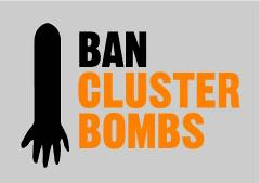
 |
| JRS and friends gather with balloons to go to Pub Street, Siem Rea |
Thirty bigger balloons were also released to mark the 30 countries that signed and ratified the Convention on Cluster Munitions (CCM). The JRS team was mobilized to celebrate (I am sure the good Lord will approve of our celebration on Ash Wednesday!). Tun Channareth organized the purchase of balloons and gathered a band consisting of people with disabilities. Sr Denise quickly managed to contact friends to assemble at the Pub Street, Siem Reap. This is the centre of activity in the town which was bustling with people and tourist during the Lunar New Year holidays. It is the cross-roads of people’s lives where paradoxes meet.
The air of excitement was prevalent. Within a few minutes curious onlookers and passers-by gathered to see what was all the excitement about. A small and mixed group of people holding 134 balloons and a huge chart with flags of countries showing checks against each flag (countries signed and/or ratified)!
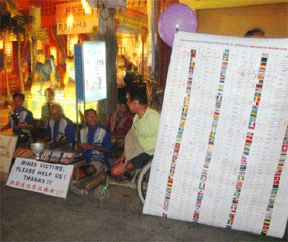 |
| Tun Channareth, Ambassador — International Campaign to Ban Landmines, partly hidden and holding out the flag of the nations. |
“What are you celebrating?”asked someone. “Today (16th February 2010) we got the 30 ratifications on the cluster munition treaty!” This became the mantra of the evening for us all as people queried and became interested. In half-an-hour we had met people from 55 different countries! Some came closer to the flags-checked chart to see if their countries have signed/ratified the treaty (including the ban landmines treaty). “Please tell your government to sign and ratify the treaty,” exhorted Tun Channareth (Ambassador to the International Campaign to Ban Landmines, actively involved in the campaign to ban cluster bombs; he is a landmine survivor without both his legs).
“May I sign here?” asked another upon seeing that her country (South Korea) has not signed the treaty. “No…no…no…Please write to your government to sign and ratify the treaty, ”was the response of Fr Bernard Arputhasamy, SJ, JRS Asia Pacific Regional Director. He happened to be visiting the JRS Team for reflection-meeting in Siem Reap when this good news hit the headlines. “Has the US signed?” came another voice as he was approaching the flag of the nations. “No…!” “Do write to your government…”.
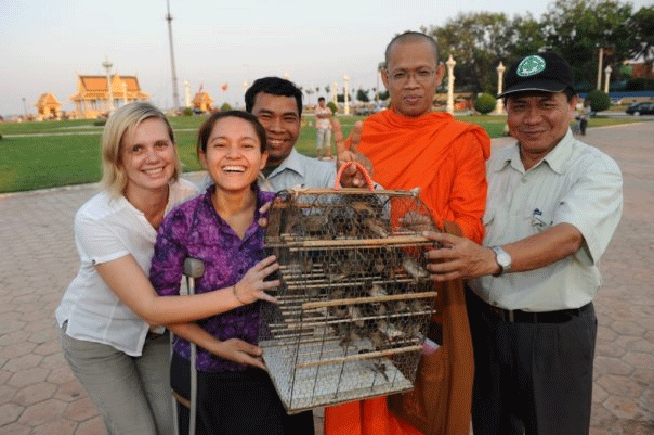 |
| A group of JRS and friends also released pigeons birds in front of the Royal Palace in Phnom Penh, Cambodia. Second from left above: Ms Song Kosal, Youth Ambassador—International Campaign to Ban Landmines, ready to release the pigeons. |
Burkina Faso and Moldova ratified the Convention on Cluster Munitions (CCM) on 16 February 2010, bringing the total number of ratifications to 30 and triggering entry into force on 1 August 2010, when the convention will become binding international law. “The first 30 states to ratify the Convention on Cluster Munitions should be proud of their central role in helping to put an end for all time to the suffering caused by these cruel and unjust weapons,” said Thomas Nash, Coordinator of the Cluster Munition Coalition (CMC). “For those not yet on board the Convention, 2010 is the year to get on the right side of history, to get in on the ground floor, and join the ban before the First Meeting of States Parties in November.”
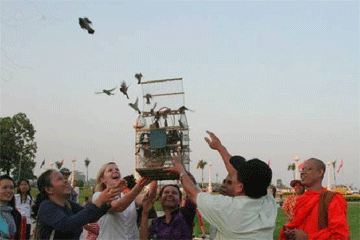
To express your support to the Convention on Cluster Munitions, sign the People’s Treaty at www.minesactioncanada.org/peoplestreaty or visit www.stopclusterbombs.org
On the 19th of February 2010 the staff of JRS (Regional and Country Office) in Bangkok, Thailand together with friends from Non-violence International and Landmine Monitor Researcher gathered at the Xavier Hall compound and then walked around the Victory Monument with a banner and 30 balloons to celebrate the ratification of the new convention. Of course, it attracted curious onlookers (including the police!). The names of the 30 countries and the dates they had signed and ratified the treaty were tied to the balloons and released at the office area in Xavier Hall.
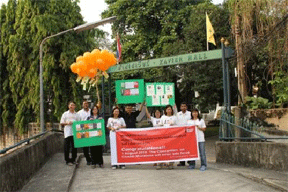 |
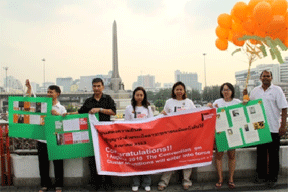 |
| JRS and friends at the entrance of the office ready with banners and 30 balloons to go to the Victory Monument, Bangkok | From left—Tawatchai, Joe, Chompoo and Bernard (far right) from RJS with friends. At the background is the Victory Monumen |
The 30 ratifying countries include states that led the “Oslo Process” effort to create the Convention (Norway, Austria, Holy See, Ireland, Mexico, and New Zealand), states where cluster munitions have been used (Albania, Croatia, Lao PDR, Sierra Leone, and Zambia), cluster munition stockpilers (Belgium, Denmark, France, Germany, Japan, Moldova, Montenegro, and Slovenia), as well as Spain, the first signatory country to complete destruction of its stockpile. Other ratifying states are: Burkina Faso, Burundi, Luxembourg, Macedonia, Malawi, Malta, Nicaragua, Niger, San Marino, and Uruguay.
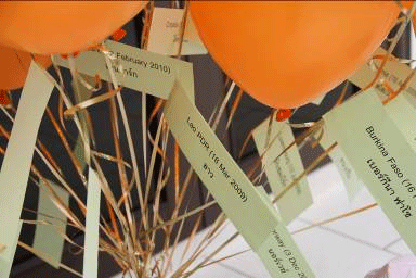
After the Convention on Cluster Munitions enters into force on 1 August, the next milestone will be the First Meeting of States Parties, which is scheduled to be held in Lao PDR in November 2010. Lao PDR is the country most heavily contaminated by cluster munitions as a result of US bombing more than 30 years ago. (Source: (http://www.stopclustermunitions.org)
“Tell the U.S. to join the Mine Ban Treaty!”
This was the clarion call throughout the world.
On 1 March 2010, the International Campaign to Ban Landmines (ICBL) campaigners have been visiting dozens of U.S. embassies worldwide to urge the U.S. to decide to join the Mine Ban Treaty without further delay!
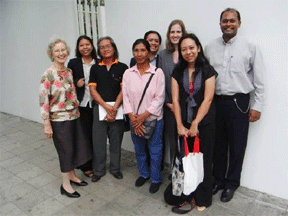 |
| The Delegation with the Second Secretary Ms Jennifer Bah outside the US Embassy, Bangkok. Despite the strict no-picture-taking policy, we could not allow this event to fade from our memory even if it means taking it way outside the US embassy grounds. The photo was actually taken by another US Embassy staff who was passing by and kindly offered to take a photo so that all of us could be part of the global action. |
JRS Asia Pacific Ban Landmine led a delegation of campaigners for a scheduled meeting (2.00-3.00 pm 10 March 2010) with Ms Jennifer Bah, Second Secretary, Political Section of the US Embassy (The US Ambassador sent his regrets). The delegation consists of Fr Bernard Arputhasamy SJ–Regional Director of JRS Asia Pacific, Ms Sermsiri Ingavanija—JRS Ban Landmines Project Coordinator, Ms Emilie Ketudat—Advisor JRS Ban Landmine Project, Mr Alfredo Lubang–Regional Representative of Non-violence International SEA, Ms Shushira Chonhenchob–Researcher of Landmine/Cluster Munitions Monitor Report, Ms Wiboonrat Chanchoo–Landmine Survivor/Chairperson of the People with Disabilities Organization, Aranyaprathet District, Sakeo and Mr Siva Boonlert–Field Manager from the Catholic Office for Emergency Relief & Refugees.
Our global call:
• The International Campaign to Ban Landmines (ICBL) and its member organizations are calling for the United States to conduct a thorough and transparent policy review that includes consultation with non-governmental organizations as well as with US allies and other governments that have joined the Mine Ban Treaty.
• The ICBL calls for the US to permanently ban the use, production, stockpiling and transfer of antipersonnel mines and accede to the 1997 Mine Ban Treaty without delay.
After going through tight security procedures (not to be underestimated!) we were received and escorted, and later escorted out, by Ms Jennifer Bah, Second Secretary, Political Section, U.S. Embassy Bangkok, to a meeting room. Mr Alfredo Lubang of Non-violence International chaired the meeting on behalf of the campaigners and thanked Ms Jennifer for granted us this opportunity for a meeting. He clearly outlined the purpose of the meeting and invited the delegation to introduce themselves.
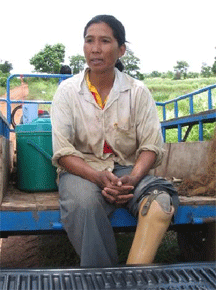 |
| “I would like to tell people in the cities that landmines are still waiting to kill or injure the villagers like me in the border.” Ms Wiboonrat Chanchoo, Landmine Survivor/Chairperson of the People with Disabilities Organization, Aranyaprathet district, Sakaeo Province; Accident date: 29 January 1996 |
JRS facilitated the privileged presence of Ms Wiboonrat Chanchoo, a Landmine Survivor/Chairperson of the People with Disabilities Organization, Aranyaprathet District, Sakeo. She shared her concerns regarding landmines surfacing from being buried in the grounds making it dangerous for passers-by. “We do not want our children and elderly especially to step on landmines…” Ms Wiboonrat herself was maimed by the landmines while working in the fields “I stepped on a landmine in 1966. My father, brother, sister and I went to cut the bamboo not far from our village. I cut 69 bamboo stalks. I needed one more stalk and then I could go back home. While trying to cut this last bamboo, I stepped on a landmine.” Her presence alone spoke volumes! She is the voice for so many people like her. She is their advocate!
Mr Fred Lubang gave various reasons why the US should ratify the Mine Ban Treaty. Most notably the US should follow the lead of 80% of the countries in the world which have joined the Mine Ban Treaty and become an integral part of the global community to end the use of this barbaric weapon. De facto the US is in compliance to some of the Treaty requirements. It has not used antipersonnel landmines since the 1991 (during the 1991 Gulf War); has not exported the weapon since 1992; has not produced antipersonnel mines since 1997; and has no plans for future procurement of anti-personnel mines. Moreover, it is already the world’s largest contributor to mine clearance and victim assistance programs. Therefore, it is only appropriate that it should match its financial commitment with a political commitment to completely end the threat of use of anti-personnel mines.
In December 2009, the US attended the Cartagena Summit on a Mine-Free World—its first-ever participation in a Mine Ban Treaty meeting—where US officials confirmed that a review of US policy is underway. The delegation commended the US for this important participation.
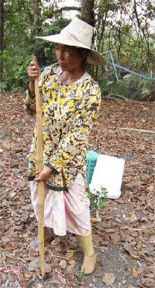 |
| Ms Wiboonrat manages her own mushroom farming in Sakeo Province, Thailand. |
A member of the delegation Mr Siva Boonlert–Field Manager from the Catholic Office for Emergency Relief & Refugees–has been working on Mine Risk Education (MRE) for the people in the Sakeo province at the Thai-Cambodia border. He highlighted, “Despite the MRE, there are still new victims even after so many years since landmines were laid in Sakaeo.” In 2009 there were about 10-16 victims of landmines in Thailand while an estimated 400 cases of people killed by landmines in Burma, commented Ms Shushira Chonhenchob and that the USA provided substantial assistance to landmine survivors from Myanmar, and other border people through funding the Mae Tao Clinic. (The clinic was visited by the former first lady Laura Bush during her visit to Thailand).
Ms Jennifer then reiterated that the present Obama administration was indeed seriously reviewing its policy. “…but we are not there yet”, she added referring to US not being a state party to the Mine Ban Treaty. The US has been concerned about the humanitarian impact and human rights and would like to get rid of landmines and has the “sincere desire” to play a role to this end. However, it was necessary for the Ministry of Defense (of the United States) to be involved in the process and would take into consideration the needs of the US military and its allies. The current review will involve all agencies concerned. To this the delegation encouraged the US administration to involve all other stakeholders’ views as well as survivors and the civil society/non-governmental organizations.
The delegation also clarified some questions raised by Ms Jennifer Bah. Regarding violation of the Treaty, Mr Fred Lubang explained that while the treaty does not have a dispute-resolution mechanism, citing the case of Thailand-Cambodia allegations against each other, there are a number of ways that the State Parties could respond to cases of violations. One of it is the annual meeting of state parties which is a forum where the states interact with each other and report on the compliance of the convention, raise crucial issues and seek a reasonable solution.
On the issue of Cluster Munitions, Ms Emilie Ketudat explained, “It is a bomb containing multiple – often hundreds – of small explosive bomblets the size of a tennis ball. The Cluster munitions are dropped from the air or fired from the ground and they break open in mid-air, releasing the bomblets over an area consisting of several football fields. Many of the bomblets fail to explode on impact and remain a threat to lives and livelihoods years after the conflict.” De facto they are landmines and they cannot discriminate between civilians and soldiers.
 |
| The symbol of Jesus Handicapped, body disabled by continued contradictions of our human condition, emerges from the context of Cambodia. Countless Cambodians live with the results of weapons of war. Picture from Jesuit Service Cambodia. |
The delegation informed that the Convention on Cluster Munitions enters into force on 1 August 2010. Thereafter, the First Meeting of States Parties will be held in Lao PDR in November 2010. Lao PDR is the country most heavily contaminated by cluster munitions as a result of US bombing more than 30 years ago.
Ms Jennifer promised to relay the contents of the meeting to Washington.
Lastly, Fr Bernard Arputhasamy closed the meeting by thanking Ms Jennifer again for her time and thoughtful participation. He stressed the important role the United States has played in mine action, especially here in Thailand. “We look forward to a full partnership of the USA on landmine and humanitarian issues by acceding to the 1997 Mine Ban Treaty.” (Source: www.icbl.org)
NOTES
About cluster bombs
A cluster munition (or cluster bomb) is a weapon containing multiple – often hundreds – of small explosive sub-munitions or bomblets. Cluster munitions are dropped from the air or fired from the ground and designed to break open in mid-air, releasing the sub-munitions over an area that can be the size of several football fields. This means they cannot discriminate between civilians and soldiers. Many of the sub-munitions fail to explode on impact and remain a threat to lives and livelihoods for decades after a conflict.
About the Convention on Cluster Munitions
The Convention on Cluster Munitions bans the use, production, stockpiling and transfer of cluster munitions and requires countries to clear affected areas within 10 years and destroy stockpiles of the weapon within eight. The Convention includes groundbreaking provisions requiring assistance to victims and affected communities. Signed in Oslo in December 2008, it is the most significant international disarmament treaty since the 1997 Mine Ban Treaty banning antipersonnel landmines.
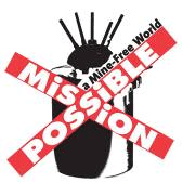
The CMC is an international coalition of around 350 non-governmental organisations (NGOs) working in 85 countries to encourage urgent action against cluster bombs. The CMC facilitates NGO efforts worldwide to educate governments, the public and the media about the problems of cluster munitions and to urge universalisation and full implementation of the 2008 Convention on Cluster Munitions (http://www.stopclustermunitions.org).
The following 104 countries have signed the Convention
Afghanistan, Albania, Angola, Australia, Austria, Belgium, Benin, Bolivia, Bosnia and Herzegovina, Botswana, Bulgaria, Burkina Faso, Burundi, Canada, Cape Verde, Central African Republic, Cameroon, Chad, Chile, Colombia, Comoros, DR Congo, Republic of Congo, Cook Islands, Costa Rica, Côte D’Ivoire, Croatia, Cyprus, Czech Republic, Denmark, Dominican Republic, Ecuador, El Salvador, Fiji, France, Gambia, Germany, Ghana, Guatemala, Guinea, Guinea Bissau, Haiti, The Holy See, Honduras, Hungary, Iceland, Indonesia, Iraq, Ireland, Italy, Jamaica, Japan, Kenya, Lao PDR, Lebanon, Lesotho, Liberia, Liechtenstein, Lithuania, Luxembourg, Madagascar , Malawi, Mali, Malta, Mexico, Republic of Moldova, Monaco, Montenegro, Mozambique, Namibia, Nauru, Netherlands, New Zealand, Nicaragua, Niger, Nigeria, Norway, Palau, Panama, Paraguay, Peru, Philippines, Portugal, Rwanda, Samoa, San Marino, Sao Tomé and Principe, St. Vincent and Grenadines, Senegal, Sierra Leone, Slovenia, Somalia, South Africa, Spain, Sweden, Switzerland, the former Yugoslav Republic of Macedonia, Togo, Tunisia, Uganda, United Kingdom of Great Britain and Northern Ireland, United Republic of Tanzania, Uruguay, Zambia.
Of these, the following 30 countries have ratified the Convention
Albania (16 Jun 2009), Austria (2 Apr 2009), Belgium (22 Dec 2009), Burkina Faso (16 February 2010), Burundi (25 Sep 2009), Croatia (17 Aug 2009), Denmark (12 February 2010), The Holy See (3 Dec 2008), France (25 Sep 2009), Germany (8 Jul 2009), Ireland (3 Dec 2008), Japan (14 Jul 2009), Lao PDR (18 Mar 2009), Luxembourg (10 Jul 2009), Macedonia (8 Oct 2009), Malawi (7 Oct 2009), Malta (24 Sep 2009), Mexico (6 May 2009), Moldova (16 February 2010), Montenegro (25 January 2010), New Zealand (22 Dec 2009), Nicaragua (6 Nov 2009), Niger (2 Jun 2009), Norway (3 Dec 2008), San Marino (10 Jul 2009), Sierra Leone (3 Dec 2008), Slovenia (19 Aug 2009), Spain (17 Jun 2009), Uruguay (24 Sep 2009), Zambia (12 Aug 2009). (Source: www.icbl.org)
Contributor: Fr Bernard Hyacinth Arputhasamy, SJ






